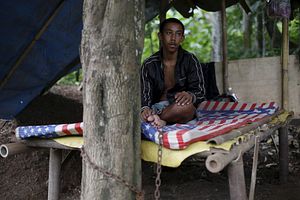As many as 57,000 people with mental health conditions in Indonesia have been shackled or locked up in confined spaces at least once in their lives. These are the findings of a new report commissioned by Human Rights Watch (HRW).
The report described the conditions for mentally ill Indonesians that are shackled and chained as “a living hell.”
“Pasung,” a decades-old practice of confining or restraining relatives with mental health problems, was outlawed in Indonesia in 1977. Yet the practice remains startlingly common, with around 18,800 people currently chained or locked up. The report documented one case of a mentally ill woman who was locked up in a room for 15 years.
“Shackling people with mental health conditions is illegal in Indonesia and yet it remains a widespread and brutal practice,” said Kriti Sharma, disability rights researcher and author of the HRW report.
“People spend years locked up in chains, wooden stocks, or goat sheds because families don’t know what else to do and the government doesn’t do a good job of offering humane alternatives,” she added.
The Indonesian government has long tried to eradicate “pasung,” but superstitious beliefs about mental illnesses and a lack of awareness is still keeping many confined in rooms and tiny spaces. Indonesians harbor the belief that mentally ill people are possessed by evil spirits. As a result, many families end up locking up their mentally ill relatives to prevent hurting themselves and others.
“They often have superstitious beliefs, of a curse, or that someone is possessed by evil spirits and therefore their only resort in their mind is chains,” Shantha Rau Barriga, the director of the disability rights programme at HRW was quoted in an online article in Al Jazeera.
Mentally ill people subjected to pasung have their ankles bound with chains or wooden stocks for time stretching into months or years. Some are even kept outside, naked and unable to wash.
Although Indonesia has an extensive healthcare infrastructure, basic mental healthcare remains scarce, particularly in the rural areas. According to the World Health Organization, there are only 800 psychiatrists and 48 mental hospitals in the sprawling archipelago, serving a population of more than 250 million. More than half of those hospitals are located in only four of the country’s 34 provinces.
The lack of mental health care and community support leaves families with few options for their mentally ill relatives.
“This is a human rights violation problem, but it is because of the scarcity of mental health services,” Hervita Diatri, a psychiatrist at the University of Indonesia’s medical school was quoted in an online article on IRINnews.
Diatri said that pasung reflects the families’ hopelessness. “Hopeless because they don’t have the money to bring their family to the mental health services… hopeless because of scarcity of the services.”
Roshni Kapur is an independent journalist based in Singapore.

































